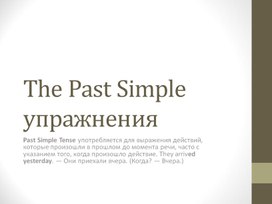Презентация урока для интерактивной доски (английский язык) по теме Past Simple

Exercise 1. Добавьте окончание -ed к глаголам
to listen, to permit, to stay, to hate, to fry, to travel, to walk, to live, to rob, to carry, to save, to clean, to hurry, to slip, to answer, to bake, to empty, to prefer, to play, to like, to regret, to talk, to reply, to plan, to wait, to close, to tidy.
Answers:
-ed: listened, stayed, walked, cleaned, answered, played, talked, waited;
-d:hated, lived, saved, baked, liked, closed; -ied: fried, carried, hurried, emptied, replied, tidied;
double consonant+-ed: permitted, travelled, robbed, slipped, preferred, regretted, planned.
Exercise 2. Из предложенного списка выберите неправильные глаголы и запишите их форму прошлого времени.
To ask, to bring, to collect, to bathe, to sleep, to keep, to read, to complete, to reply, to grow, to show, to say, to fly, to put, to relax, to cook, to shake, to leave, to act, to give, to protect, to cost, to blow, to move, to meet, to order, to lose, to forget, to play, to feel.
Answers:
to bring — brought, to sleep — slept, to keep — kept, to read — read, to grow — grew, to show — showed, to say — said, to fly — flew, to put — put, to shake — shook, to leave — left, to give — gave, to cost — cost, to blow — blew, to meet — met, to lose — lost, to forget — forgot, to feel — felt.
Exercise 3. Раскройте скобки, употребляя глаголы в Past Simple.
What your neighbours (to do) yesterday?
Mr. Smith (to fix) his car yesterday morning.
His wife (to water) plants in the garden.
Their children (to clean) the yard and then they (to play) basketball.
In the evening their boys (to listen) to loud music and (to watch) TV.
Their little girl (to cry) a little and then (to smile).
Her brothers (to shout) at her.
Mrs. Smith (to work) in the kitchen.
She (to bake) a delicious apple pie.
She (to cook) a good dinner.
She (to wash) the dishes and (to look) very tired.
The children (to brush) their teeth, (to yawn) a little and (to go) to bed.
Their mother (to change) her clothes and (to brush) her hair. Then she (to talk) on the phone.
Her husband (to smoke) a cigarette and (to talk) to his wife.
They (to wait) for the bus. The bus (to arrive) at 9 o’clock.
They (to visit) their friends.
They (to dance) a lot there.
Mr. and Mrs. Smith (to rest) very well last night. They really (to have) a wonderful time at their friends.
Answers:
.1What did your neighbours do.
2. Mr Smith fixed.
3. His wife watered.
4. Their children cleaned, they played.
5. Their boys listened, watched.
6. Their little girl cried, smiled.
7. Her brothers shouted.
8. Mrs Smith worked.
9. She baked.
.
10. She cooked.
11. She washed, looked.
12. The children brushed, yawned, went.
13. Their mother changed, brushed, talked.
14. Her husband smoked, talked.
15. They waited, the bus arrived.
16. They visited.
17. They danced.
18. Mr and Mrs Smith rested, they really had
© ООО «Знанио»
С вами с 2009 года.
![]()

